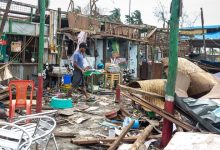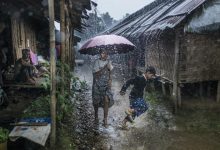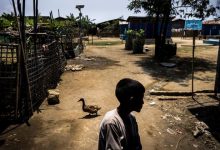Life in DPR Korea still ‘daily struggle devoid of hope’ warns human rights chief
 The international community must continue to pay close attention to the troubling human rights situation in the Democratic People’s Republic of Korea (DPRK) and find ways to revive dialogue with the Government, the UN Security Council heard on Wednesday.
The international community must continue to pay close attention to the troubling human rights situation in the Democratic People’s Republic of Korea (DPRK) and find ways to revive dialogue with the Government, the UN Security Council heard on Wednesday.
Ambassadors held an open meeting on the human rights situation in the country, commonly known as North Korea, convened by Japan, the Republic of Korea, the United Kingdom and the United States.
China and Russia opposed the meeting and called for a procedural vote by the 15 members, which was defeated.
Alone and claustrophobic
Briefing from Geneva, UN High Commissioner for Human Rights Volker Türk described the DPRK as “a country sealed off from the world” and “a stifling, claustrophobic environment, where life is a daily struggle devoid of hope.”
He urged the Government “to flip the orthodoxies and overcome its isolationist mindset which only breeds deeper and deeper distrust, setting off a never-ending spiral of groupthink at the expense of a more prosperous and secure future for its people”, adding that “human rights, in all their dimensions, offer a solution and a way forward.”
The protracted nature of the human rights situation there “is trapping people in unmitigated suffering”, in addition to being a factor behind instability that has wider regional ramifications.
“It is not possible to divorce the state of human rights in the DPRK from considerations around peace and security in the peninsula, including increasing militarization on the part of the DPRK,” he insisted.
Unable to leave
Mr. Turk highlighted the deepening repression of the right to freedom and movement in the DPRK. Recent months have seen a limited partial re-opening of the border, and it is now nearly impossible for people to leave unless they have permission from the Government.
“In short, we are witnessing a situation where people can no longer leave even when they are in the most desperate of circumstances or at peril of persecution,” he said.
“One consequence is that divided families are even more divided. No departures means no reunification with families abroad.”
Harsh laws, chilling consequences
Repression of freedom of expression has also worsened, particularly due to laws on the consumption of foreign media, eliminating regional dialects, and ensuring young people “conform to a socialist lifestyle”, all of which carry harsh punishments.
One “particularly chilling example” is that North Koreans “are at risk of death for merely watching or sharing a foreign television series”.
Hunger and forced labour
Mr. Türk noted that socioeconomic conditions have become “unbearably harsh” in the DPRK, and he was particularly troubled by the lack of access to food.
“Reports indicate that almost half of the population is food insecure in recent years, with child wasting on the rise in some provinces,” he said,
Meanwhile, “forced labour persists in many forms” and the authorities also maintain a high level of control on workers sent abroad.
The UN rights chief said he has also consistently raised the issue of enforced disappearance, both inside the DPRK and of citizens from other countries such as neighbouring South Korea and Japan, which has occurred over the past 70 years.
“Painfully, the full truth as to the fate of these people – which we estimate to be over 100,000 – remains unknown to this day,” he said.
‘U-turn’ out of isolation
Mr. Turk stressed the importance of continued international attention on the human rights situation in the DPRK.
“The landscape of misery, repression, fear, hunger and hopelessness in the DPRK is profoundly alarming,” he said.
“All paths out of this start with making a U-turn from the dead end of self-imposed isolation: opening the country, re-engaging with the international community, enabling people-to-people contact, embracing international cooperation, and focusing on the wellbeing of all people.”
More to follow…
Dave Belson, as the esteemed Editor-in-Chief, brings a wealth of experience and insight to his leadership role. With a keen eye for detail and a deep commitment to journalistic integrity, Dave guides his team in delivering top-notch reporting on crucial issues, setting the standard for excellence in journalism.



